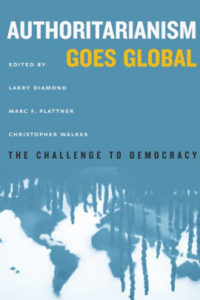 At the geostrategic level, the state of global affairs today is defined by two principal trends: the growing assertiveness of Russia and China, the two principal revisionist states; and the accelerating realignment of states worldwide in response to this rising pressure. And for the first time the West seems too divided to launch a coherent response to this ideological pressure from abroad, notes Andrew A. Michta, the dean of the College of International and Security Studies at the George C. Marshall European Center for Security Studies.
At the geostrategic level, the state of global affairs today is defined by two principal trends: the growing assertiveness of Russia and China, the two principal revisionist states; and the accelerating realignment of states worldwide in response to this rising pressure. And for the first time the West seems too divided to launch a coherent response to this ideological pressure from abroad, notes Andrew A. Michta, the dean of the College of International and Security Studies at the George C. Marshall European Center for Security Studies.
On paper, the West stands head-and-shoulders above any real and potential peer-competitors according to any reasonable economic measure. Judging by the numbers alone, the West should be able to dominate its adversaries, he writes for the American Interest. However……..:
The re-engineering of the Western cultural narrative over the past 50 years, first in our educational systems and media, and now within politics writ large, has effectively deconstructed the foundations of our shared Transatlantic civilization…[including] the most enduring political debates that have shaped the Western democratic tradition. ….Today the very bedrock of the Western political tradition is under assault. In addition, for at least three decades immigration policies across the West have shifted away from acculturating newcomers to the now regnant multiculturalist ideology, which has resulted in unintegrated “suspended communities.”
Sources of the West’s Decline
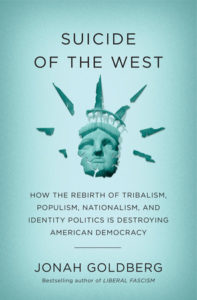 “In the process, in a growing number of democracies the larger national identity, historically tied to the overarching Western heritage, has been subsumed under ethnic and religious group identities,” Michta adds. “The Transatlantic alliance that has preserved, protected, and promoted democracy since 1945 will be effectively undone, regardless of whether or not NATO continues to exist.”
“In the process, in a growing number of democracies the larger national identity, historically tied to the overarching Western heritage, has been subsumed under ethnic and religious group identities,” Michta adds. “The Transatlantic alliance that has preserved, protected, and promoted democracy since 1945 will be effectively undone, regardless of whether or not NATO continues to exist.”
The obsession with the “old” West during this year’s Munich Security Conference will delay any strategic realignment of its priorities as Russia and China, but also Japan and India, move on to define their interests. The West reacts as the rest of the world changes, argues Judy Dempsey, a nonresident senior fellow at Carnegie Europe and editor in chief of Strategic Europe.
How are Western leaders going to take stock that the idea of the old West, one of Atlanticism, needs to break out of this geographical setting and mindset? she asks, citing the MSC’s elegant and worthy town hall meeting focused on a new publication: Defending Democracy and a Rules-Based Order.
This would mean creating a wider security, political, and economic architecture that could include Japan and South Korea, Australia and New Zealand, and African and Latin American countries. It would be about widening and deepening democracy and its values.”
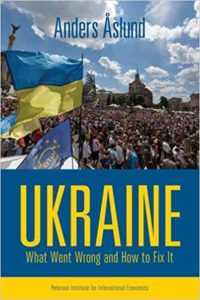 Not least in Russia’s periphery……
Not least in Russia’s periphery……
For 2019, the West should patiently pursue its policy of supporting Ukraine, argues Steven Pifer, a Nonresident Senior Fellow at the Brookings Institution:
U.S., European and international financial institution officials should be ready to engage the Ukrainian president in the spring and the new Rada and prime minister in the fall on the country’s future reform course. Those discussions could be delicate, particularly if populist ideas win in the elections. Western donors will have to resist backsliding on what Ukraine has achieved and press for completing the critical mass of reforms that would allow the economy to grow at a substantial and sustained rate. Given their assistance funds and low-interest credits, the donors will have leverage.
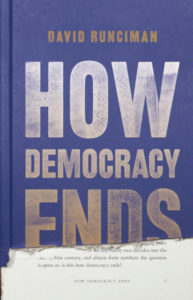 The current crisis of Western democracy has prompted speculation about its possible looming failure, drawing on historical and international comparisons, argues David Runciman, Professor of Politics at Cambridge University, and author of How Democracy Ends. But these comparisons are often the wrong ones, and the future of democracy needs to be framed in different terms: the demographic and technological changes of the twenty-first century mean that the twentieth century is a poor guide to our likely fate.
The current crisis of Western democracy has prompted speculation about its possible looming failure, drawing on historical and international comparisons, argues David Runciman, Professor of Politics at Cambridge University, and author of How Democracy Ends. But these comparisons are often the wrong ones, and the future of democracy needs to be framed in different terms: the demographic and technological changes of the twenty-first century mean that the twentieth century is a poor guide to our likely fate.
Instead, the conventional relationship between political action, institutional continuity and social transformation needs to be reconfigured to make sense of where we are and where we might end up, he contends.
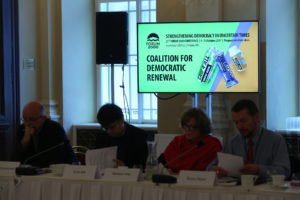
21st Forum 2000 Conference
Democratic renewal demands the realization that “the West is no longer the old West,” Dempsey insists. “It’s about reaching out to democracies across the globe.”
“This time it’s about the bigger horizon that should define the contours of the West,” she adds. “About using globalization and digitization to support values and democracy and humanitarian support for refugees”
But at what point does a democracy’s ability to respond to new challenges become overwhelmed? Michta asks in The Sources of the West’s Decline







